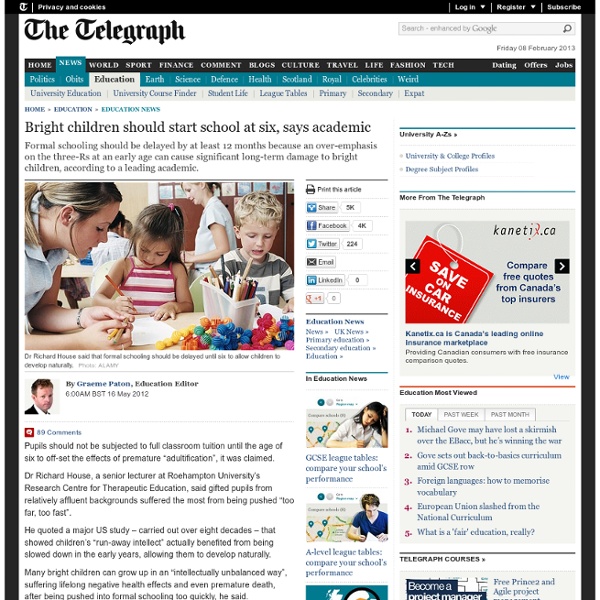Bright children should start school at six, says academic
Dr House, who was due to present his findings at a major conference in central London on Wednesday, called on the Government to launch an independent inquiry into England’s school starting age. He said: “The conventional wisdom is that naturally intelligent children should have their intellect fed and stimulated at a young age, so they are not held back. “Yet these new empirical findings strongly suggest that exactly the opposite may well be the case, and that young children’s run-away intellect actually needs to be slowed down in the early years if they are not to risk growing up in an intellectually unbalanced way, with possible life-long negative health effects.” At the moment, most English children start school in nursery or reception classes at the age of three or four and are taught using the Early Years Foundation Stage – a compulsory “nappy curriculum”. They then move into formal lessons at the age of five.
Homeschool Preschool Curriculum
Need a homeschool preschool curriculum? Have you thought about homeschooling your child – but aren’t sure you have what it takes to persevere? Homeschooling during the preschool ages is a great way to try everything out and see if it’s going to work for your family. Homeschooling preschool children also has many side benefits. It gives you something constructive to do during those long daytime hours while your husband is at work. And it will help you bond with your children in a way that nothing else will. You can purchase a great homeschool preschool curriculum that is all ready to go, if that’s what you’re interested in doing. Later on, we did work through the Bob Jones 3-year-old preschool program and also the Bob Jones 4-year-old preschool program. Below is a list of fun preschool activities for you to try with your child. Preschool Fine Motor Skills: Let your child play with pattern blocks. Lincoln logs are another fun activity – especially when dad can also be involved.
"should be raised to six"
'It can 'cause major developmental harm, and at worst a shortened lifespan', claims expert By Richard Hartley-parkinson Published: 07:56 GMT, 16 May 2012 | Updated: 11:14 GMT, 16 May 2012 Children should not have to start school until they are six to prevent early 'adultification', an academic has claimed. Going against conventional wisdom that their intellect should be fed and stimulated early on, education expert Dr Richard House says that over-emphasis on the three Rs - reading, writing and arithmetic - can actually cause long-term damage. The senior lecturer at Roehampton's University for Therapeutic Education added that rather than starting school at the current standard age of four or five, those with 'runaway intellect' would do better if they were slowed down. Schoolchildren would be allowed to develop more naturally if they started at six years old academic Dr Richard House says FOUR: Northern Ireland FIVE: England, Malta, Netherlands, Scotland, Wales Dr Richard House
Its never too early to start teaching
You have cookies turned off To use this website, cookies must be enabled in your browser. To enable cookies, follow the instructions for your browser below. Facebook App: Open links in External Browser There is a specific issue with the Facebook in-app browser intermittently making requests to websites without cookies that had previously been set. Open the settings menu by clicking the hamburger menu in the top rightChoose “App Settings” from the menuTurn on the option “Links Open Externally” (This will use the device’s default browser) Windows Enabling Cookies in Internet Explorer 9 Open the Internet BrowserClick Tools (or “gear” icon at top right hand corner) > Internet Options > Privacy > AdvancedCheck Override automatic cookie handlingFor First-party Cookies and Third-party Cookies click AcceptClick OK and OK Enabling Cookies in Internet Explorer 10, 11 Enabling Cookies in Firefox Enabling Cookies in Google Chrome Mac Enabling Cookies in Safari Enabling Cookies in Mobile Safari (iPhone, iPad)
Related:
Related:



